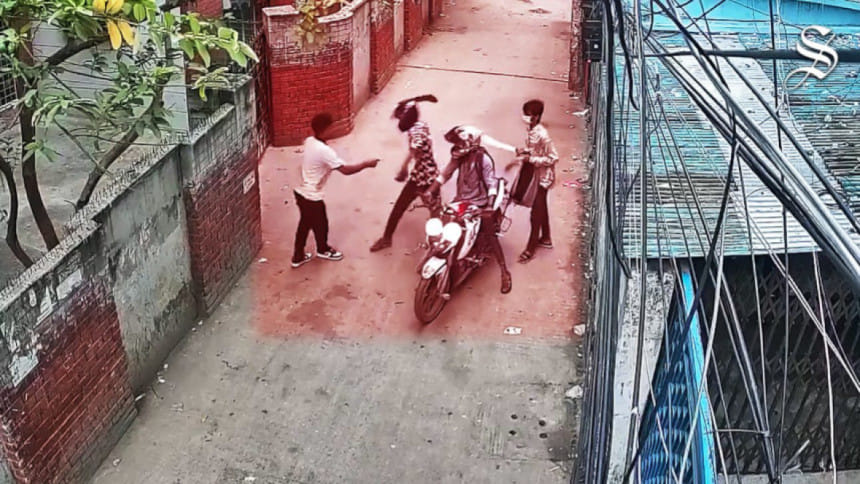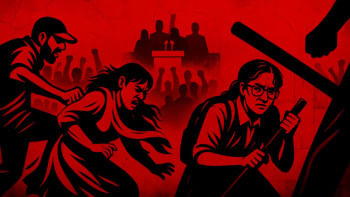Rising crime, institutional failure, and the bystander effect

Social psychologists refer to this phenomenon as the "bystander effect." In a moment of crisis, a victim is likely to get less support in the presence of a group of individuals or witnesses. The bystanders simply assume that someone else in the crowd will intervene. This diffusion of responsibility reinforces mutual denial, allowing the perpetrator to thrive.
I was trying to make sense of the endless pixelated images on social media where young men are seen carrying machetes in the open, snatching mobiles or personal goods from cars or rickshaws. They prowl like hyenas in the city jungle. Yet, there is no visible intervention from the bystanders, and little follow-up by police. Our urban experiences have taught us that interventions may prove to be costly and are unlikely to change anything. This reflects in our defence mechanism: while I can risk my life to apprehend one of the perpetrators, they will likely return to the streets due to legal loopholes. Therefore, it's safer to share my dashcam footage, video recorded on mobile phones, or CCTV clips than to act.
The collective numbness contradicts the spirit with which the masses stormed the streets in July last year. Now, we pray: dear God, let me not be the next victim, the one to bleed or die in public or lose my gadgets that store my privacy. Our silent prayers take the form of a hapless sigh or an emotional social media post or comment. We scroll, hoping our digital virality will conjure some police action.
Our moral muscle has atrophied. We are back to a Darwinian maxim: survival of the fittest. The foundation of civility, the social contract of solidarity, is in danger of disappearing. With survival as the dominant civic impulse, democracy and its paraphernalia are at risk. Law and Order is a press conference that premiered at 3am at the home minister's theatre. The number of crimes is on the rise. Even official figures by the police depict a dismal scenario. The dull stats and numbers get some human faces when video footage becomes available. Nothing in the country moves without public outrage. Law enforcement agencies don't react unless a protest is significant enough to capture the government's attention. The actors who have entered the political stage after the fall of the Awami League regime are reading from the old script. The government occasionally apprehends a few low-level criminals, neglecting the underlying causes of chaos. Even the much-hyped Operation Devil Hunt brought little relief to public fear.
Some blame the rise in crimes on the 700 prisoners out of the 2,200 who escaped on and after August 5. Officials also accuse the fallen regime of conspiring to harm the reputation of the interim government. But when organised crimes occur in broad daylight, we need to question the impunity with which these criminals operate. Claiming that organised crime networks are taking advantage of temporary fragility in governance is an argument without substance. The government has had enough time to address the political vacuum that reportedly weakened institutional checks. It is the job of the authority to uplift the morale of its forces and give them a clear directive on deliverables.
We have already seen how some high-density urban corridors in Mohammadpur, Mirpur, Jatrabari, Farmgate, Gulshan, and Khilgaon have become crime hotspots. Attacks frequently target the blind spots under the Hanif Flyover, metro stations, and the elevated expressway. The pattern of attack in locations that act as choke points in the city's mobility grid signals the operational control of the criminals. They are deliberately targeting places with lower police visibility, crowd fluidity, or symbolic value. Most of these muggers and attackers are in their teens and early 20s. Many of them were probably protected earlier by some Awami League bosses. In the absence of patrons, these muggers and attackers have now opportunistically switched their allegiance. Their motivations are more economic than ideological.
The use of narcotic substances is another issue. The porous border allows drugs to become easily accessible. With law enforcement agencies focused on mitigating bigger political problems, drug culture among the youth gangs is on the rise. Reports suggest that these gangs are even using police as their agents. Several reported incidents have implicated law enforcement agencies or former uniformed men in robberies, muggings, and kidnappings. Corrupt police officials have become a part of the problem.
Even when victims go to report muggings or thefts, police seem more worried about the spike in their reported statistics. Social media posts become substitutes for formal complaints. It is a shame that the police only act when a footage goes viral or when the media speaks out. Those running the country should realise that their inaction undermines the state's moral legitimacy.
Is it, then, appropriate to hold the general public accountable for their bystander effect? Our expectation of someone else acting in the face of an ongoing crime symbolises both our delusion about the legal system and our own defence mechanism. Often, the criminals nabbed by police get bail and return to the streets. Such judicial leniency or loopholes can frustrate and discourage the police, who often risk their lives to nab criminals. Without fast-track trials or stronger prosecutorial arms, deterrence is practically null. And for juvenile offenders, correction centres often serve as incubators for future crimes rather than being places where they are reformed.
Let us also not lose sight of the sociological drivers. The economy is still in a state of disrepair. Unemployment is at a record high. Soaring commodity prices push the youth to survival crime. The disillusionment following the uprising has left many of them feeling rudderless. They observe how one group of their peers with political connections receives preferential treatment over the other. With the disappearance of the former regime, old patronage networks are dissolved. Many of the foot soldiers are now on their own. In summary, we have entered a period where survival takes precedence over civics. We want to be bystanders with a prayer on our lips: dear God, let not the next victim be me!
Dr Shamsad Mortuza is professor of English at Dhaka University.
Views expressed in this article are the author's own.
Follow The Daily Star Opinion on Facebook for the latest opinions, commentaries and analyses by experts and professionals. To contribute your article or letter to The Daily Star Opinion, see our guidelines for submission.

 For all latest news, follow The Daily Star's Google News channel.
For all latest news, follow The Daily Star's Google News channel. 










Comments